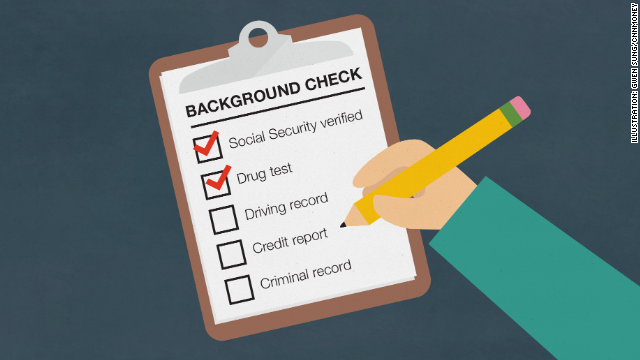Increased compliance means rising numbers of employers are performing numerous background checks on employees.
Eight key checks employers must make:
- Criminal record checks.
- Social media screening.
- Credit checks.
- Education and credential verifications.
- Reference checks.
- Right to Work checks.
- DVLA checks.
- Public safety verifications.
Complete Guide to Background Check for Employers
Criminal record checks are the most common checks, which must be performed for any type of work with children or vulnerable adults. Not only is this check necessary for jobs with education, healthcare, or similar institutions, but it is also required for jobs that involve handling money or entering private homes. Schools, nurseries, and daycares must also ask for a criminal record check from parents of their students.
The full check is relatively simple: the body simply checks the information provided in the subject’s application and the details registered with the NCIS National Police Database. However, there can be two different issues that can arise on full background checks: convictions not reported to the NCIS and foreign convictions.
When a criminal conviction is not registered with the NCIS, it means that it has not been reported to the police for criminal record purposes. It doesn’t necessarily mean that there is no conviction or that the conviction isn’t serious in nature; generally, it just means that the police have not been informed.
Foreign convictions can also cause issues if they are reported incorrectly, or not at all, in England. The NCIS does not hold foreign convictions in its system. Instead, they are dealt with by the Disclosure Scotland. Sadly, not all foreign convictions are reported to them either: depending on the country, there are still a number of foreign convictions that are not reported.
For example, convictions from the United States are not shared online with the UK because of the lack of an extradition treaty between the two countries. However, if an employer is fully checking the background of a potential employee from the United States, they will need to contact the local magistrate’s office where the person was given their criminal record.
Social media screening can also cause issues. The NCIS have commented on this in the past, saying that criminals are more likely to leave evidence of their crimes on social media, but that this does not mean it is an effective tool for employers to use in their hiring process. In August, it was found that 5% of employers were using social media background checks to find out more about potential staff members. Although it is still a highly debated topic, it seems that this percentage will only rise as time goes on.
Credit checks are now seen as an essential part of the recruitment process, especially for jobs involving handling money. Many employers have found that they are wasting time and money hiring staff members who cannot be trusted with money and ultimately prove to be a bad investment.
A credit check is relatively simple: employers simply get in contact with the credit rating agency and ask them to find out the financial status of the applicant. They are usually able to find out any financial issues, including data about any outstanding debt. They are also able to find out potential red flags that could indicate an issue with the employee’s credit rating, including bankruptcies and extreme financial problems.
Education checks are a relatively new addition to the background check process. When it comes to dealing with employees who you employ out of necessity, you want to make certain that they have the skills they need for the jobs.
For this reason, many employers are now performing education checks on potential employees to make sure that they are really the experts they claim to be. Studying a follow profession, or speaking multiple languages, makes a potential employee stand out. However, it is possible that this person has only chosen to study a harder subject because they were in need of a good grade.
A simple check is all you need to find out if the person is truly a professional in this field, or if they have simply lied to the employer.
Credential checks are a type of background check that employers generally won’t know to ask for. They are not needed if the job is low-level, as no qualifications are required.
However, for jobs in certain industries, a good education goes a long way to getting the job. For teachers, nurses, and other professions for example, it is necessary to contact the relevant regulatory body to find out if the subject has any rights to work.
This type of background check is easier than it sounds. The regulatory body simply needs to be contacted, and they will provide the relevant details. A simple phone call is all it takes to find out if the applicant is entitled to work in this field, and to confirm that they have the skills and credentials needed for the job.
Reference checks are a great way to check up on the person’s past. You can ask the previous employers of a potential employee for information on their performance at work, levels of success, and any other relevant information.
The issue arises when employers simply do not check up on references. It’s a waste of time if you don’t use the information that references give you, but it’s also a waste of time calling them in the first place if you have no intention of checking up.
Employers can ask up to five previous employers, and must check all five. If a potential employee has been lying about the number of employers they have worked for, a quick check with the previous employers can expose this. Even a quick check can reveal if an employer has really contacted the previous employer or not, which is often all it takes to spot a lie.
It is vital to make sure that you are using references as part of your recruitment process, and to make certain that you check up on the references as soon as possible afterwards.
DVLA checks are another type of background check that are becoming more common. These checks can be used to check whether the person applying for the job will be able to do what they want to do.
Often, if a person applies for a job that is different to the one they have previously worked in, the employer will perform a DVLA check on the employee to find out if they are really eligible to work in the UK.
This is an essential part of the recruitment process. Employers should not use any patient with a medical history that may prove distracting, but must make certain that they are ready for what they are applying for.
Public safety checks are a very important part of the background check process. It is not limited to just checking whether the subject has a criminal record.
Any job that involves dealing with money, entering properties, or working closely with children or vulnerable adults is necessary for this type of check. Forming relationships with the people the check is being made for, or the children in this case, is almost impossible if the police are on your back.
It is also necessary in jobs where you are handling money with discretion or that could be stolen, for example. Employers should make certain that each member of their workforce is completely clean, as there are many people out there who would be happy to take advantage of an opportunity for money, especially if it’s someone else’s, and past convictions are often a sign that the person is willing to take that opportunity.
Why Background Checks are Important for Recruitment?
Background checks are an essential part of the recruitment process, and they have been for years. However, these days, they are more important than ever.
Unfortunately, many employers do not perform background checks on potential employees, and of those who do, many do not do a very good job. There are a number of reasons why this happens, but most of them are pretty superficial compared to the reasons that checks are important.
Firstly, background checks are becoming more and more important as time goes on. These days, employers not only need to check up on potential employees, but also on the people that this employee will probably be working with, including potential clients, customers, and other staff members. You definitely do not want to be hiring people who have bad reputations.
A criminal record check may not be required for some jobs, but it is still critical. If you don’t check up, you won’t know if someone has a criminal record or any financial problems.
The same goes for education checks, too. It’s important to make sure that potential employees are actually qualified for the job. Employment tribunals are now a common thing, making it even more essential to hire knowledgeable people that know what they’re doing. And education checks are a very easy way to do this.
In terms of reference checks, they’re just a waste of time if you don’t use them; they are only worth doing if you pay attention to them. You can’t call 10 out of 10 references and expect to get information out of all of them. But if you only call three or four out of five, there’s a pretty good chance that one of them will answer and provide some interesting information.
Credential checks are important. If the job requires a certain qualification, then it is necessary for the job applicants to have those qualifications. This can be a passport, a certificate, or a qualification that can be verified online at the relevant body’s website. It doesn’t matter how long ago the person did the qualification or how hard it was to obtain. The fact is that they did the qualification, and they should be doing the job for a reason.
DVLA checks are also a must for certain jobs, especially where road journeys are concerned. For jobs involving driving, for example, it is necessary to check whether the applicants have any driving related convictions – not just for licensing related offenses.
If the job is required to deal with money, such as a job in finance, there is a very high chance that the employer will need to conduct a fraud check. If the employees do not have any links to the mafia, it’s a long shot.
Alternatively, if the job is related to teaching, care, or working with vulnerable adults or children, then a police check is an essential part of the recruitment process. It wouldn’t be too good if an old criminal record or sex offender record came back to haunt them in the classroom, or care.
A detail check is also a necessity for many jobs. The more stringent the job, the more likely it is that a detailed background check will be undertaken. It is not unheard of for companies to check references and take references from previous employers.
Where possible, it’s worth also checking public records to see if the person has anything that may cause issues. If, for example, a person has a public profile that they might have to deal with, then it is easy to check to see if the person has anything that may cause problems for other people working with them. This type of report is regularly used when employees who frequently deal with the public are being hired. It’s far too easy for a customer to say, for example, that they were assaulted by the employee and for the employee to sue them if this sort of information is not checked.
What can Employers do to Protect themselves when they are hiring a New Employee?
The most important thing that employers can do is to make certain that they are going to ask the right questions and will take the time to check the details with no details taken for granted.
Background checks are the biggest line in the sand that law enforcement agencies have when it comes to verifying or authenticating someone’s credentials.
If not, then the employer is putting the whole company at risk. Background checks are absolutely essential for vital positions in medical companies, perhaps because of the serious nature of medical jobs, including medicine, nursing, and physiotherapy to name a few. It is hard to ignore the fact that in any business, but the medical profession is one where high standards very much have to be upheld. After all, we need to be confident that whatever is done to us by our medical professionals is done so with the utmost care, and if background checks had been done, they would be to a very high degree. .
Background Checks are Very Important for the Hospitality Career.
The hospitality industry is a very competitive place. Everyone wants to travel a little, and everyone wants to work in a place where they can get recognized a little bit. However, the hospitality industry is also a very public place, and anyone can make a bad management job. Background checks are the essential to help in the selection process, and it is one of the most common ways to make certain that who you hire is a proper person.
Remember that background checks are a very sensitive issue. There are a lot of different factors that will affect the outcome of the check. There are many establishments and organizations that will not accept a person who has a record due to the time it could take to get that record out of their hands, and also due to the fines associated with it.
To avoid any problems with law enforcement, it is highly recommended to conduct all of the background checks with specific agencies or the individuals themselves. There are great companies that offer this service, and here are a few examples of good providers that you can use to do your own cheap and reliable background checks.
References and referrals are the best ways to start the reference check when looking for employees, and these are probably the most solid ways of verifying a person’s credentials. Get the references to do the reference check. You will find a lot of problems surfacing if you don’t. If you are planning to hire the right candidate, then you just need to find out about their education and employment experience.
The credentials check can also be done online, just by checking these sites to get a good read of the credentials you might be hiring.
Reference checks are also necessary. Once you’ve got the references, you need to ask them about the person’s work experience, education and character to get a feel for the person you want. If you are not sure what to ask or you’re not sure what questions to ask, you should use some forms provided by the professional agencies.











